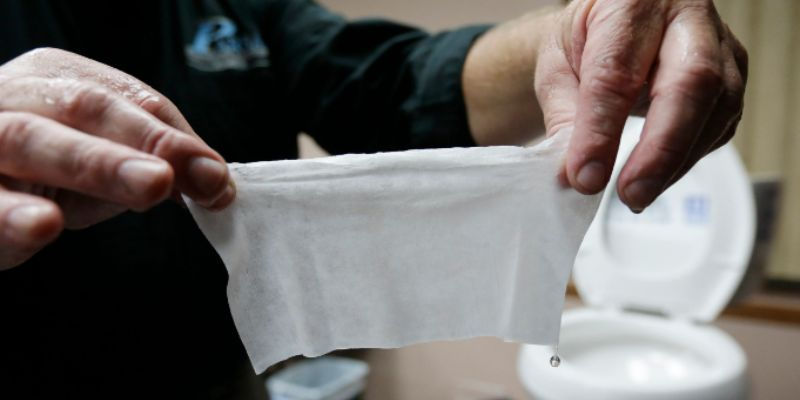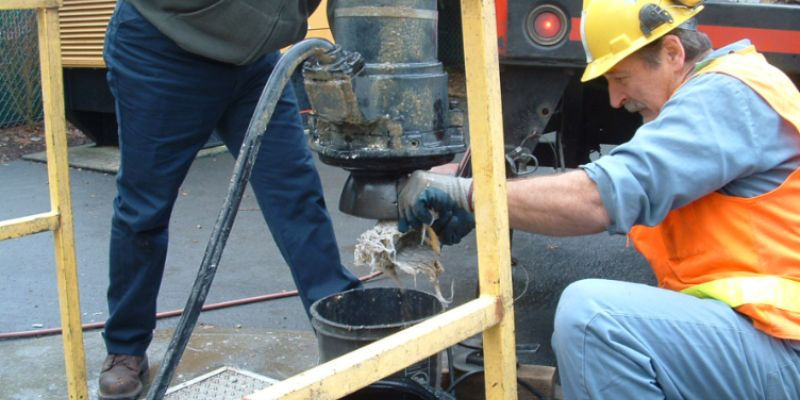Flushable Vs Biodegradable Wipes. Understand The Difference
- Mar 15, 2022
- 3 min read
Updated: Oct 9, 2024
Wipes are disposal, pre-moistened sheets whose main purpose is to provide cleaning and hygienic solutions for personal use, baby care, surface cleaning, or more.
Whether you’re using biodegradable baby wipes or flushable wipes for personal hygiene, both have their own pros and cons. But are wipes flushable?
Both biodegradable wipes and flushable wipes should not be directly flushed in the toilets as they create clogging over time in the septic tank, and damage the overall septic system.
But how to dispose of these wipes? In this blog post, we’ll get to know about both wipes and the flushable vs biodegradable wipes difference. So let's get started!
What are Flushable Wipes?

Flushable or flushable baby wipes are used for personal use after using the toilets. Most households use this product regularly, as it’s marketed as a safe alternative to toilet paper as they can be flushed down.
But the question is: Do flushable wipes break down? Yes, they can break down but they are thicker and often take longer time to disintegrate.
But this integration generates another question: Are flushable wipes safe for septic tanks? Due to the slow breaking process, these wipes are not often good for septic tanks as they create clogs, and slow down the water process which can harm the environment.
What Are Biodegradable Wipes?

Biodegradable wipes are specifically designed to decompose naturally. These wipes are environmentally friendly and are good for baby skin.
But the question is: Are wipes biodegradable? The answer depends on the product you’re using, although most of them are. But still, they pose challenges for septic systems.
When the use of wipes is excessive, they create clogging in the septic tanks and cause maintenance issues for homeowners.
What Is The Difference Between Flushable Vs. Biodegradable Wipes?

Aspect | Flushable Wipes | Biodegradable Wipes |
Material Composition | Often made of synthetic fibers that are more resistant to breakdown. | Usually made from natural fibers that decompose more easily. |
Breakdown in Water | Designed to break down in water, but may take longer and can cause clogs in plumbing and septic systems. | Tend to break down faster and more completely in composting environments, but still can cause issues in septic systems if not disposed of properly. |
Septic System Impact | Can be problematic for septic systems, often leading to clogs and backups. | Generally safer for septic systems but should still be used sparingly to avoid potential issues. |
Environmental Impact | Can contribute to environmental pollution due to slower degradation. | Less harmful to the environment due to quicker and more complete biodegradation. |
Suitability for Flushing | Marketed as flushable, but many municipal sewage systems advise against flushing them. | Not typically recommended to be flushed, even if labeled as biodegradable. |
Use Cases | Commonly used for personal hygiene and cleaning purposes. | Often preferred for sensitive skin and eco-conscious consumers. |
Cost | Can vary, generally affordable but may incur additional plumbing costs due to potential clogs. | Often priced higher than regular wipes due to eco-friendly materials. |
How To Dispose of Flushable And Biodegradable Wipes In A Septic Tank?

To carefully and completely dispose of flushable and biodegradable wipes in the septic tanks, Here are the steps that you should take:
Avoid Overuse:
Limit the use of flushable and biodegradable wipes, although they can be disposed of. But, the heap of wipes creates clogging issues in septic tanks and generates nasty odors in the toilets. Avoid doing this.
Use Septic-Safe Wipes:
When taking such products, ensure that they are labeled as septic-safe. So that they don’t damage your septic system.
Regular Septic Tank Maintenance
Schedule a plan for the maintenance of your septic tank, and do a thorough inspection of it, to avoid future issues.
Add Bacteria Additives
Highly used bacteria or enzyme additives that are specifically designed to help break down septic tank solids quickly.
Monitor Drain Field
You should regularly inspect drain fields to avoid blocking or overflowing of the water.
Avoid Chemicals
Avoid using harsh chemicals while flushing or cleaning as they can harm the bacterial system of your septic tank.
Educate Household Member
Providing education from kids to adults doesn't limit the excessive use of wipes. If they understand this fact, half of the problems in your septic system will not occur again.
Seek Professional Help
If you can’t inspect the septic system issues, you can call a professional like Barnes Sewer & Septic, we have expert skills and experience to resolve your septic issues.
Conclusion
Having a clear understanding of flushable and biodegradable wipes for your septic system is essential. Without this knowledge, you can’t run a good septic system that’s clogging-free.
With proper inspection, maintenance, and using the right additives you can extend the life of your septic system. This way, you can secure costly repair and replacement of your septic system.
Still facing issues, where are these nasty odors coming from? We’re here to protect and guide you thoroughly. Call us at (765) 584-7295 and we will be at your place sooner.




Comments